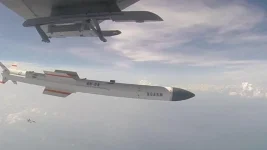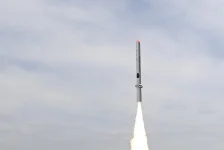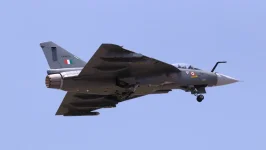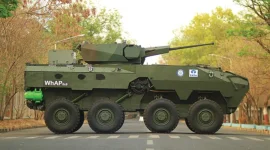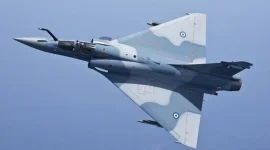- Views: 2K
- Replies: 6
Greece is showing significant interest in incorporating Indian defence technologies into its fleet of French-made Rafale fighter jets, marking a potential deepening of defence cooperation between the two nations.
This exploration could involve integrating advanced Indian avionics, software, structural components, and weapon systems, such as the Astra air-to-air missile and the Smart Anti-Airfield Weapon (SAAW). These systems are already being added to the Indian Air Force's (IAF) own Rafale aircraft.
This move comes as Greece seeks innovative, cost-effective solutions for modernising its air force, having received all 24 of its ordered Rafale jets between 2021 and 2024.
The Hellenic Air Force's acquisition of the Dassault Rafale, a versatile twin-engine fighter, commenced under a government agreement in January 2021. The initial delivery included 18 aircraft – six new models built to the F3-R standard and 12 pre-owned jets from the French Air and Space Force. An additional six new Rafales arrived in 2024, bolstering Greece's defence posture in the Eastern Mediterranean amid regional tensions.
However, the high cost associated with French armaments, notably the Meteor Beyond Visual Range Air-to-Air Missile (BVRAAM), and the limited range of the older MICA missile system, have led Greece to investigate more affordable yet capable alternatives.
Reports indicate that Greece views India, with its rapidly developing indigenous defence sector, as a potential partner to lessen its reliance on expensive European weapon systems. Integrating Indian technology could offer Greece greater operational flexibility for its Rafale fleet and potentially foster a beneficial technological partnership between the countries.
India's expanding aerospace capabilities present several appealing options for Greece. The IAF, which inducted its 36 Rafale jets between 2020 and 2022, is already integrating domestic systems onto these platforms, offering a potential model for Greek adoption. Among the key Indian technologies being considered are:
- Astra Missile: Developed by India's Defence Research and Development Organisation (DRDO), the Astra Mk-1 is an advanced BVRAAM with a reported range exceeding 100 km, designed for high agility. It is already integrated with the IAF's Su-30MKI fighters and planned for its Rafale and Tejas aircraft. The Astra is seen as a significantly more economical option compared to the Meteor missile, which, while having a longer range (over 200 km), reportedly costs upwards of ₹25 crore per unit. The Astra, estimated at ₹7-8 crore per unit, offers a way for Greece to diversify its missile inventory affordably. Future versions, like the Astra Mk-2 (expected range 160+ km) and the ramjet-powered Mk-3, are also under development.
- Smart Anti-Airfield Weapon (SAAW): This precision-guided glide bomb, also developed by DRDO, has a range of 100 km and is designed to disable enemy runways, bunkers, and other critical infrastructure. Its successful integration onto IAF Rafales highlights India's capability to adapt its weapons to sophisticated foreign aircraft, potentially enhancing Greece's ground-attack capabilities.
- Avionics and Software: India is making strides in aircraft electronics, including the development of the Uttam Active Electronically Scanned Array (AESA) radar and advanced mission computers. These could potentially offer Greece upgrades or supplements to the Rafale's existing radar systems. Custom software development could also provide Greece greater operational independence and reduce dependency on French permissions for future system modifications.
- Structural Components: Indian companies, including state-owned Hindustan Aeronautics Limited (HAL) and private firms like Tata Advanced Systems, possess considerable expertise in manufacturing aerospace parts. They could potentially supply Greece with competitively priced structural elements or spare parts, improving the long-term sustainability of its Rafale fleet.
Simultaneously, the older MICA missile, with its 60-80 km range, is becoming less effective against modern aerial threats. The Indian Astra missile could offer a capable middle ground.
Furthermore, collaborating with India could enhance Greece's strategic independence. Diversifying its defence suppliers reduces reliance on a single source like France, mitigating potential risks from supply chain issues or geopolitical changes.
India's own experience in integrating indigenous technology onto the Rafale platform provides a tested path that Greece might emulate, possibly negotiating for more flexibility with the manufacturer, Dassault Aviation, for future upgrades.
This current interest follows earlier reports from June 2024 suggesting Greece proposed joint Rafale procurement negotiations with India to strengthen their bargaining position with France. While that focused on acquisition, the present focus on technological integration signifies a potentially deeper, long-term partnership.
For India, successfully exporting systems like the Astra or SAAW for use on Greek Rafales would be a significant achievement for its "Make in India" initiative and could pave the way for similar deals with other Rafale operators, including Egypt, Qatar, and Indonesia, thereby expanding India's global defence footprint.

